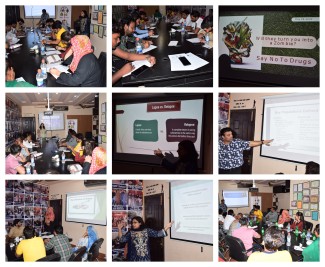“Training of Trainers (TOT) workshop regarding Substance Abuse Prevention”

Training of Trainers (TOT) workshop regarding Drug Abuse Prevention has been organized by EQUIP Research & Developments in collaboration with the Ministry of Narcotics Control, Govt. of Pakistan on 8th May 2022 at EQUIP head office, Multan, Pakistan. This TOT workshop was very informative for all the participants and it was designed according to the need of the participants. We have the attendees including, psychologists, pharmacists, social workers, human rights activists, media representatives, college/university students, teachers, etc. The TOT workshop has been conducted by trainers & resource persons who were having extensive experience in the field of Drug Abuse, HIV/AIDS Awareness, Prevention, and research.
Mr. Kashif Kamran Khan, who has got MBA, MPhil in Business Administration & MPhil, has also done Universal Prevention Curriculum (UPC) courses 1, 2 5 & 8 by UNODC. He has lots of National & International certifications in Drug Treatment & Prevention & HIV/AIDS, he is the Youth Leader of the youth forum Pakistan for drug Abuse prevention, a member of the International Society of Substance Use Professionals (ISSUP), a member of the Australia & New Zealand Mental Health Association, member of International AIDS Society (IAS) & also the founder & Managing Director of EQUIP Research & Development Consultants, defined about the “Correlation between Drug & spreading of HIV/AIDS” - Basic concepts of HIV & AIDS, Injecting Drug users in Pakistan, types of HIV, how to get HIV, symptoms of HIV & AIDS & Myths about HIV/AIDS.
Mrs. Amber K Khan, who has done her BS (Hon) in Biological Sciences, MSc in Gender & Women Studies & MPH/MPhil (Public Health), rendered services in various renowned educational institutes over the past 10 years, earned numerous certificates related to health & education, member of International Society of Substance Use Professionals (ISSUP), an expert in primary/ secondary research & surveys & also in SPSS for research analysis, conducted sessions on “Introduction to the Science of Addiction” - Key terminologies with description, Substance use and abuse, Effects of substance abuse, progression of substances. She also told about the “Psychoactive Substances”- Basic of Psychoactive Substances, the Effects of Psychoactive Substances, progression of Substance Use.
Dr. Saman Fatima, who is a dentist by profession & Public Health expert, completed BDS/RDS, MPH/MPhil, CHPE (NUMS), MME Scholar (UOL), Dept. of Dental Education; BAMDCH has shared information regarding Synthetic Drugs, their facts & effects. She also told us about the “Effects of synthetic drugs, their uses & effects” - anxiety, aggressive behavior, paranoia, seizures, loss of consciousness, nausea, vomiting, and even coma or death. She taught us about Fentanyl, Synthetic Marijuana, Synthetic LSD, Synthetic Stimulants, Synthetic PCP, and the short & long-term consequences of synthetic drugs.
Ms. Mahnoor Khan, who has recently done her Pharm. D, a part of EQUIP Team for the last 2 years and has been taking part very actively in Drug Abuse, HIV/AIDS prevention & other public health issues. She shared very useful information regarding the Classification of illegal drugs & their categories;
Class A Heroin (diamorphine), Cocaine, Methadone, Ecstasy, LSD (Lysergic Acid Diethylamide), and Magic Mushrooms. Class B drugs in Pakistan: Amphetamines, Methamphetamine, Barbiturates, Cannabis, Cathinone. Class C drugs in Pakistan: Benzodiazepines (tranquilizers), GHB/GBL (Gamma-hydroxybutyrate/Gamma-butyrolactone), Ketamine, Benzylpiperazine.
She also talked about the cheap and unclassified Drugs in Pakistan. There have been reports of people sniffing some drugs to get high temporarily which affects your brain and makes you dizzy. The following are available for anyone at any time and it has been the worst as prolonged use can have severe effects and can lead to brain damage or internal bleeding: Petrol, Paint Thinners, Paint, Diesel, Glue, etc.
EQUIP management has urged our teammates, volunteers, and training participants to indulge the general population to contribute to the fight against Drug Abuse & HIV/AIDS. Their leadership and advocacy ensure that the response remains relevant and grounded, keeping people at the center and leaving no one behind & communities that include peer educators, networks of people living with or affected by Drug Abuse & HIV, people who inject drugs, and commercial sex workers, women and young people, counselors, community health workers, door-to-door service providers, civil society organizations and grass-roots activists.
Greater mobilization of communities is urgently required to address the barriers that stop communities from delivering services, including restrictions on registration and an absence of social contracting modalities. The strong advocacy role played by communities is needed more than ever to ensure that Drug Abuse Prevention & HIV/AIDS remains on the political agenda that human rights are respected and that decision-makers and implementers are held accountable.
In the end, we pay deep gratitude to the Ministry of Narcotics Control, Govt. of Pakistan as they have inspired us to work more passionately so that we could be able to eliminate this curse from society and make Pakistan free from Drug Abuse.
